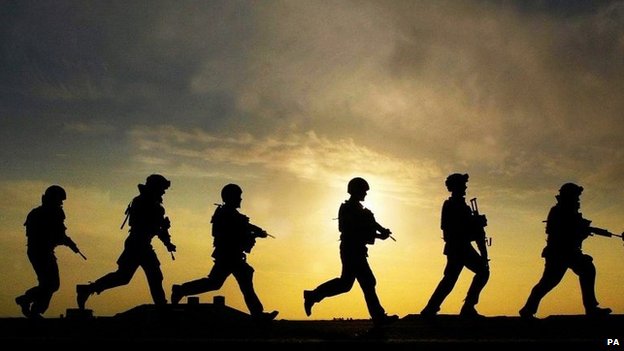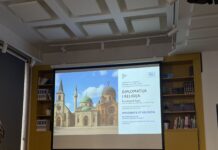
The Army is setting up a new unit that will use psychological operations and social media to help fight wars “in the information age”.
Head of the Army General Sir Nick Carter said the move was about trying to operate “smarter”.
The 77th Brigade, made up of reservists and regular troops and based in Hermitage, Berkshire, will be formally created in April.
It has been inspired by the Chindits who fought in Burma in World War Two.
An Army spokesman said the unit would “play a key part in enabling the UK to fight in the information age” and that it “consists of more than just traditional capabilities”.
 The Army, led by Gen Sir Nick Carter, could face cuts following the general election
The Army, led by Gen Sir Nick Carter, could face cuts following the general electionHe said: “77 Brigade is being created to draw together a host of existing and developing capabilities essential to meet the challenges of modern conflict and warfare.
“It recognises that the actions of others in a modern battlefield can be affected in ways that are not necessarily violent and it draws heavily on important lessons from our commitments to operations in Afghanistan amongst others.”
Recruitment for the brigade, 42% of whose personnel will be reservists, will begin this spring.
Its members will come from the Royal Navy and RAF as well as from the Army.
 The new unit is said to share the “spirit of innovation” of the Chindits in the Burma Campaign of 1942-45
The new unit is said to share the “spirit of innovation” of the Chindits in the Burma Campaign of 1942-45The unit will also seek “new ways of allowing civilians with bespoke skills to serve alongside their military counterparts”.
The Army spokesman said it would share the “spirit of innovation” of the Chindits in the Burma Campaign of 1942 to 1945.
Chindits was the name given to the Long Range Penetration (LRP) groups that operated in the Burmese jungle behind enemy lines, targeting Japanese communications.
The new unit will also use the old Chindit insignia of a Chinthe, a mythical Burmese creature which is half-lion and half-dragon.
Analysis
 Psyops’ work includes the design of leaflets such as these distributed in Afghanistan in 2008
Psyops’ work includes the design of leaflets such as these distributed in Afghanistan in 2008By BBC defence correspondent Jonathan Beale
The Army says it’s learnt valuable lessons from Afghanistan – not least that it can’t win wars using pure military force alone.
The brigade will be made up of warriors who don’t just carry weapons, but who are also skilled in using social media such as Twitter and Facebook, and the dark arts of “psyops” – psychological operations.
They will try to influence local populations and change behaviour through what the Army calls traditional and unconventional means.
Civilians with the right skills will work alongside regular troops and reservists and could be sent anywhere in the world to help win hearts and minds.
It can be seen as proof that the Army is adapting to modern asymmetric warfare, and that it remains relevant at a time when there are fears within the British military of more cuts after the election.
‘Rebranding attempt’Paul Rogers, a professor of international security at the University of Bradford, said the announcement represented a “big expansion” of the Army’s psychological operations and was an “attempt to rebrand and update” this area of its work.
“We had so much difficulty in Iraq and Afghanistan, it’s about trying to learn the lessons of how these groups are using social media,” Prof Rogers explained.
He added: “In some senses it’s defensive – trying to present the case from this side against opponents who hold many of the cards.
“We’ve seen with Islamic State, its incredible capability on the net, Facebook, Instagram and all the rest.”
A former Army officer involved in psychological operations in the Balkans, Afghanistan and Iraq, Simon Bergman, predicted it would help build “the Army for the future”.
“For example, 77 brigade have a large component of civil affairs soldiers who’ll be operating in populations, working with them, achieving military effects – and a broader effect, because as we know from Afghanistan, the military doesn’t work in isolation. It works as a component of government.”












